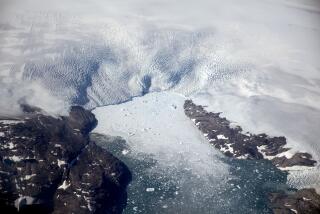Book review: ‘Here on Earth’ by Tim Flannery
Earth could use a biography. Tim Flannery has delivered a provocative one in time for Earth Day.
Despite the rising level of greenhouse gases warming the Blue Planet and the failure to unite governments behind efforts to arrest the trend, Flannery is optimistic for Earth’s future and that of its most destructive inhabitants: you and me.
That’s not to say there aren’t reasons to fall into a funk while reading “Here on Earth,” the latest work from one of the planet’s great field zoologists and thinkers. Flannery doesn’t bury the hard facts of climate change. But unlike those who believe the human race has evolved into a species incapable of the long-term thought and unity that can save it from overconsumption, Flannery falls in with those who still believe we can save ourselves, in part by retooling our thinking of evolution itself.
“We have trod the face of the Moon, touched the nethermost pit of the sea, and can link minds instantaneously across vast distances. But for all that, it’s not so much our technology, but what we believe that will determine our fate,” Flannery proclaims in his “dual biography” of the planet and mankind. “Today, many think that our civilization is doomed to collapse,” he writes. “Such fatalism is misplaced. It derives in large part from a misreading of Darwin, and a misunderstanding of our evolved selves. Either such ideas will survive or we will.”
“Survival of the fittest” is perhaps the most regrettable and misunderstood phrase in all of science. Absent from Darwin’s work until the fifth edition of “On the Origin of Species,” the phrase nonetheless has plagued Darwinism for more than a century and has been misused to justify social and economic hierarchy, unequal distribution of resources, imperialist conquest and now the suicide of our species.
The best adherent to fatalistic Darwinism is Peter Ward, whose “Medea” thesis (named for the Greek goddess who exacted revenge on her unfaithful husband by killing their children) holds that “species will, if left unchecked, destroy themselves by exploiting their resources to the point of ecosystem collapse,” Flannery writes.
But the ultimate trajectory of human evolution, notwithstanding the central catalyst of competition and selection, tends toward a cooperative “super organism” capable of governing its actions to preserve its ecosystem (in this case, an entire planet) and thus its survival, Flannery argues. “If competition is evolution’s motive force, then the cooperative world is its legacy,” he writes.
It’s a long intellectual distance to travel from fatalism to guarded optimism, but Flannery pulls it off, guiding readers away from the social Darwinism of 19th century philosopher Herbert Spencer toward the subtler insights of Alfred Russel Wallace, “the first modern scientist to comprehend how essential cooperation is to our survival.”
To do so, Flannery rests on the theory of James Lovelock and the notion of “Gaia” — Earth as “a self-regulating system made up from the totality of organisms, the surface rocks, the ocean and the atmosphere tightly coupled as an evolving system” that ultimately regulates its surface conditions to be favorable to life.
The trick, for humans, will lie in our ability to evolve through the climate change we’ve started, and to do so, Flannery argues, we will have to rely on ideas and beliefs transmitted as “memes” in a fashion similar to the replication of the “selfish gene” of Richard Dawkins. Flannery offers examples of cultures whose “memes,” including their taboos and self-sacrificial behaviors, cooperation, sharing and co-evolution, appear to contradict ruthless competition, mitigating it toward the cooperation and moderation that better ensure survival of the whole.
There is plenty of room to argue that the human “super organism” lacks a command-and-control system that will enable it to coordinate actions in time to save itself. But if ants have accomplished the same feat, as recent science suggests, why not humans?
The spirited argument on behalf of man and planet contained in “Here on Earth” constitutes what should be called the Tim Flannery meme: informed optimism about our ability to save ourselves. All it needs for survival is the “Darwinian” resolve to replicate itself in our progeny.
Mohan edits The Times’ environmental coverage.
More to Read
Sign up for our Book Club newsletter
Get the latest news, events and more from the Los Angeles Times Book Club, and help us get L.A. reading and talking.
You may occasionally receive promotional content from the Los Angeles Times.







